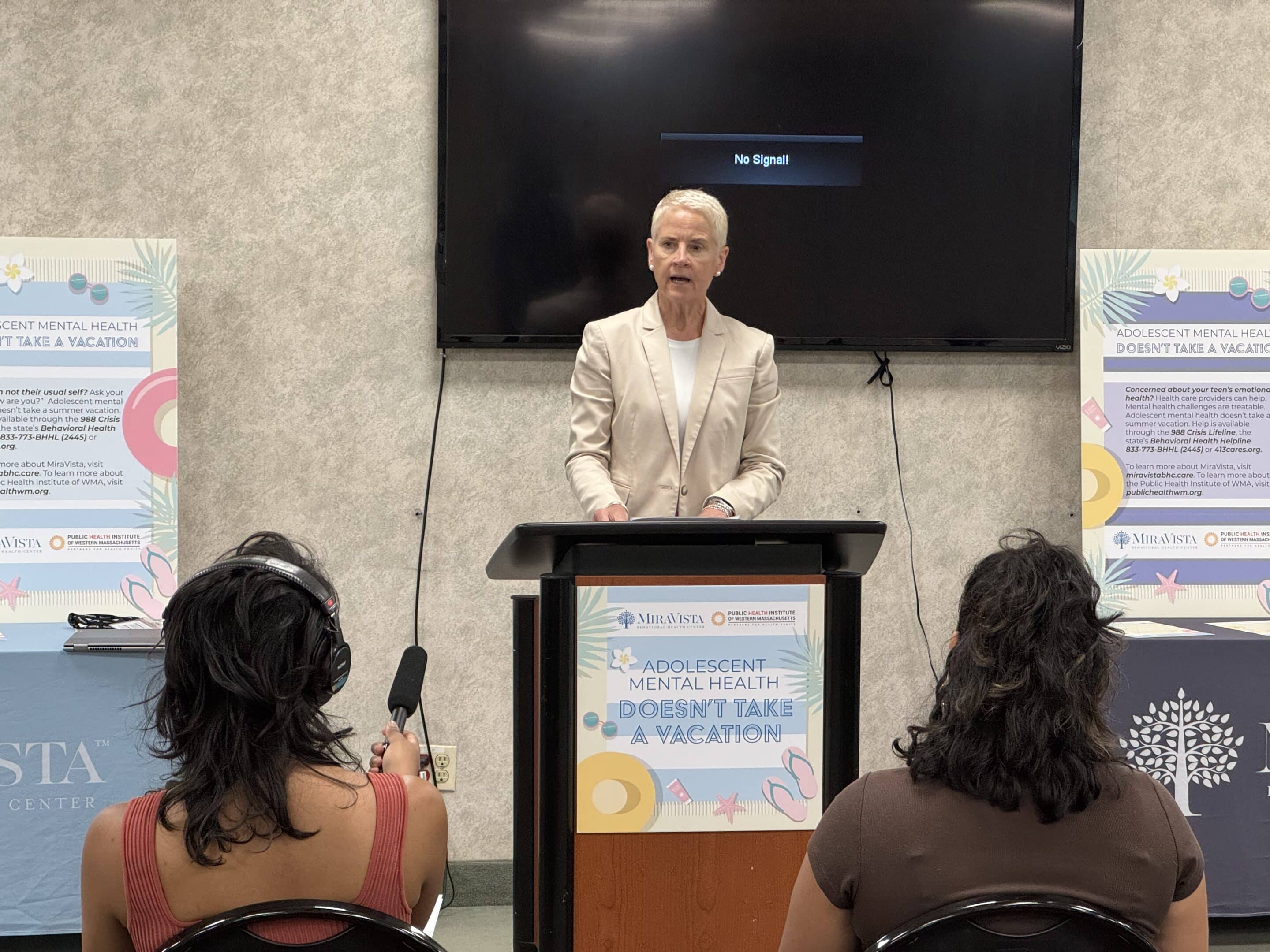MiraVista Chief of Creative Strategy and Development Kimberly Lee announces the partnership to create this campaign for adolescent mental health.
Reminder Publishing photo by Trent Levakis
HOLYOKE — A teen mental health campaign was announced at a June 18 press conference at MiraVista Behavioral Health Center in Holyoke where representatives from the organization and the Public Health Institute of Western Massachusetts spoke on how this work can help young people’s emotional wellness.
The campaign titled “Adolescent Mental Health Doesn’t Take A Vacation” will bring attention to teenage mental health concerns during the summer season. MiraVista Chief of Creative Strategy and Development Kimberly Lee said while summer is a time off for teens from school, a lack of connectivity and social activity during that stretch can lead or add to feelings of loneliness.
“We know from both national and state data that poor mental health continues to be on the increase among young people,” said Lee. “Being away from school friends and school supports during the extended summer break can be isolating for some teens. Our campaign is designed to remind parents, trusted adult caregivers, community providers, as well as adolescents, that help is available when someone is struggling emotionally and to remember they are not alone.”
Lee explained weekly social media posts for the campaign will carry short messages such as, “There’s no shame in having feelings or seeking help to deal with them,” or “Ask your teen how they are doing and take time to listen without judgment.”
“Throughout the summer months we will utilize a variety of mediums to reach out and engage our community through various channels including social media, TV, radio, as well as print publications to spread our message. Each medium is tailored to address the key elements of adolescent mental health, ensuring that we provide relevant and accessible information to all,” Lee said.
The common sentiment shared for building a foundation for youth to be open about their mental health concerns is for the adults in their lives to focus on open communication and being a trustworthy source for the teen to speak to.
“We know that there’s still stigma that remains around talking about mental health and it’s really important to talk about it, so we’re encouraging parents and young people to check in and talk about it. For young people to be engaged and connected, we know that social isolation is a risk for poor mental health, so encouraging them to be involved in volunteering and activities in their communities with peers and with adults,” said Kathleen Szegda, senior director of community research and evaluation at the Public Health Institute of Western Massachusetts.
Lee added sometimes an emotional issue can be resolved through good communication between adult caregivers and child.
“Adults who model taking care of their own mental health can make it easier for a teen in need of such help to seek it. This is also one of the campaign’s messages,” Lee said.
Executive Director of the Public Health Institute of Western Massachusetts Jessica Collins said this partnership on the campaign was important in blending community prevention and clinical support.
“Adolescence is a critical time for mental health development and ensuring young people have access to support during the summer months is particularly important,” Collins said. “Youth health surveys conducted across Western Massachusetts have generally seen an increase over time in students reporting depressive symptoms, with more than two out of five students doing so in 2023. We hope this campaign will help inform parents, guardians and the community about ways to promote good mental health and the resources available to our young people.”
The Public Health Institute of Western Massachusetts builds measurably healthier and more equitable communities through community engagement, collaborative partnerships, research and evaluation and policy advocacy.
MiraVista Behavioral Health Center in Holyoke opened in April 2021 and offers impatient psychiatric care services for both adults and adolescents, as well as an array of outpatient addiction treatment programs.
“While summer is indeed a time for enjoyment and relaxation, it is also a period when we must remain vigilant about the mental health of our adolescences by staying connected, ensuring and encouraging health activities, being aware of the signs, and providing resources, we can help our youth navigate this time safely,” Lee said.



